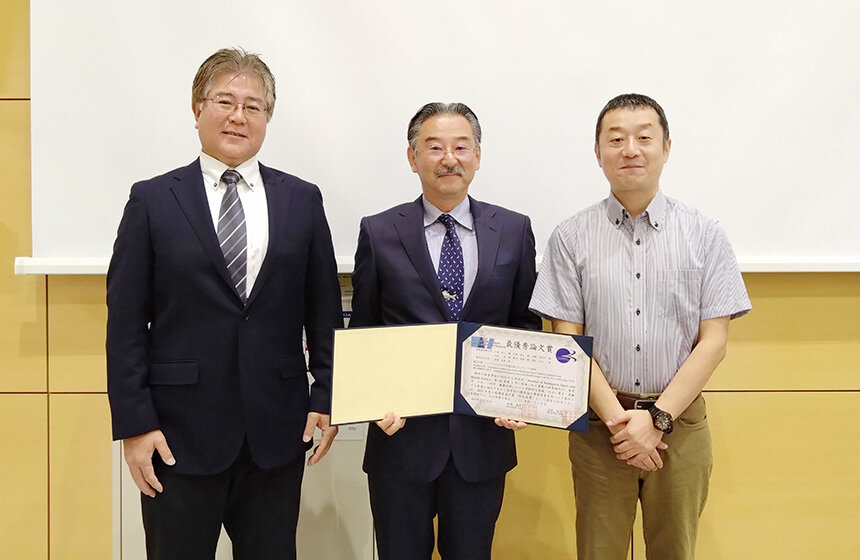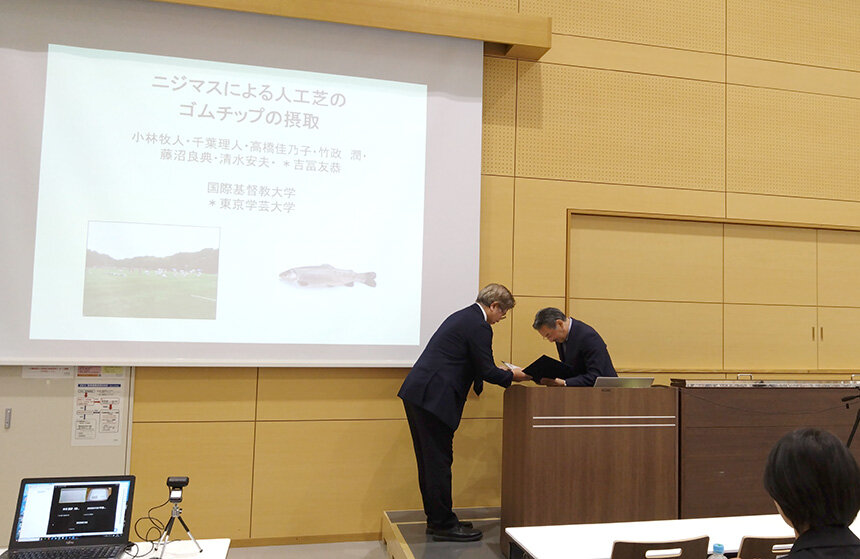NEWS
ICU Professor Makito Kobayashi and Others Win Best Paper Award at the Conference of Kanagawa Society of Physical Education and Sports Science
Update: October 20, 2023
 (From left) President Tetsuji Ishii, Associate Professor at Kanagawa University; Makito Kobayashi, Professor by Special Appointment at ICU; and Best Paper Award Selection Committee Chair Yuki Yamaguchi, Associate Professor, J. F. Oberlin University
(From left) President Tetsuji Ishii, Associate Professor at Kanagawa University; Makito Kobayashi, Professor by Special Appointment at ICU; and Best Paper Award Selection Committee Chair Yuki Yamaguchi, Associate Professor, J. F. Oberlin UniversityA study written by several ICU professors and graduates has received the Best Paper Award for this year from the Kanagawa Society of Physical Education and Sports Science. The study, titled "Ingestion of Rubber Tips from Artificial Turf Sports Fields by Rainbow Trout," was written based on the experiment conducted by Makito Kobayashi, Professor by Special Appointment, Department of Natural Sciences, ICU; Yasuo Shimizu, Senior Associate Professor, ICU (no departmental affiliation); Ryosuke Fujinuma, Associate Professor, Department of Natural Sciences, ICU; Rihito Chiba, ICU graduate (ID21 major: Environmental Studies); Kanako Takahashi, ICU graduate (ID22 major: Biology; minor: Environmental Studies); Jun Takemasa, ICU graduate (ID21 major: Biology); and Tomoyasu Yoshitomi, Professor at Tokyo Gakugei University.
The experiment-based study, which was contributed to the Journal of Kanagawa Sport and Health Science, connects physical education facilities (artificial turfs) with an environmental issue (microplastic).
Research summary:
Recent years have seen more and more artificial turf sports fields in Japan. The surface layer of artificial turf is made of polyethylene turf leaves and rubber tips, which serve as an impact-absorber for athletes. Our previous study showed that such turf leaves and rubber tips are released into the environment as microplastic, and it demonstrated that goldfish (Carassius auratus), an omnivorous fish, ingests rubber tips. This study shows that rainbow trout (Oncorhynchus mykiss), a carnivorous fish, also ingests rubber tips, suggesting that microplastic released from artificial turf sports fields can be ingested by wild fish and food fish. Preceding studies on sports facilities are largely aimed at improving the skills of athletes and securing their safety. This study, however, has enlightened the importance of people involved in sports to respect the environment--the aspect highly evaluated by the selection committee.
Comment on receiving the award (by Makito Kobayashi, Professor by Special Appointment):
It is a great honor that our environmental science study has been appreciated by an academic society related to physical education. I played American football in my high school and university days. At ICU, I served as adviser for the American Football Club for 15 years. Now I play kickboxing as a hobby. I have always been involved in sports--all as an amateur. As a researcher, I specialize in biology, environmental studies, and fisheries science. In my mind, however, sports (artificial turfs), environmental studies (microplastic), and fisheries science (the fishing and aquaculture industries) are all interconnected. As such, I consider how microplastic affects not only ecosystems but fisheries in Japan. Such an approach won the understanding of Kanagawa Society of Physical Education and Sports Science, a group of professional researchers on physical education. Nothing would give me greater pleasure than that. It was also a great pleasure for me to be able to work with outstanding researchers and students.
The study is available here in PDF format.

